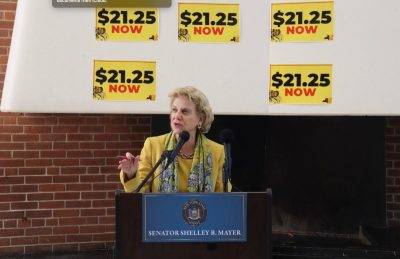Legislators, Worker Advocates Push to Raise New York’s Minimum Wage
News Based on facts, either observed and verified directly by the reporter, or reported and verified from knowledgeable sources.

Most of Westchester’s state legislature delegation has thrown its support behind a proposal that would increase the state’s minimum wage to $21.25 by 2026 to help thousands of lower-paid workers keep pace with inflation.
The Raise the Wage Act would be automatically indexed for inflation that is consistent with the Northeast region for each ensuing year after that, eliminating the need for future adjustments.
State Sen. Shelley Mayer (D-Yonkers), a Senate co-sponsor of the bill, led a press conference on Friday in White Plains with other lawmakers and representatives from about 15 nonprofit organizations that support the measure.
“We know that when we increased the minimum wage to $15 an hour, and some of my colleagues were here, we brought people out of poverty and allowed people to have a life that was livable as a minimum wage earner,” Mayer said.
However, with the high rate of inflation since 2021 at between 6 and 8 percent annually, households that had seen their standard of living rise when the minimum wage rose to $15 by 2019, have lost about 15 percent of their purchasing power, according to figures supplied by Mayer’s office.
There are several competing proposals, including one from Gov. Kathy Hochul in January that would institute a cost-of-living increase starting in 2024. However, proponents of Raise the Wage counter that Hochul’s plan fails to account for the high inflation rate since the $15-an-hour minimum wage took effect. The Examiner contacted the governor’s office on Friday but did not receive a response.
Legislators contended that the proposal would not only be good for workers but would help the economy by attracting and retaining employees and allowing working class people the ability to buy merchandise that they would otherwise be unable to afford.
“For many years in this country, we’ve been told that the way to grow an economy and create more jobs and create more wealth is to give money to rich people because they will invest it,” said Assemblywoman MaryJane Shimsky (D-Dobbs Ferry). “That’s not the way it works. The way it really works is if people can’t afford to buy what you’re selling, the economy isn’t going to go anywhere and your business is not going to go anywhere.”
Under the proposed Senate bill that was introduced in January by state Sen. Jessica Ramos (D-Queens), the body’s Labor Committee chair, the minimum wage would increase to $17.25 next January, to $19.25 by January 2025 and to $21.25 by Jan. 1, 2026, in New York City, Long Island and Westchester. For the rest of the state, there would be a slower rise to $16, $18 and $20 an hour for the start each of the next three years.
Lawmakers pointed to other high-cost states and cities that have enacted a higher minimum wage that has or will go into effect. Washington, D.C., San Francisco, Denver and Seattle will all have an hourly minimum wage of between $20 and $21 by 2027. The state of Massachusetts will see its minimum wage rise to $20 that same year.
There is pushback from the business community and organizations that represent their interests. Jon Ravitz, executive vice president and COO of the Business Council of Westchester, called for an analysis of the impacts on businesses. He said owners want to help their employees, but a mandate coming so soon after the height of the pandemic would hurt many businesses.
“To raise the minimum wage now is really going to put more businesses on their backs,” Ravitz said. “We haven’t been able to do a really comprehensive analysis on the impacts on small businesses and not-for-profits when the minimum just went into effect last time.”
Assemblyman Matt Slater (R-Yorktown) said he understands the push for elevating the minimum wage but is also aware of the challenges facing the business community.
“We are trying to combat record high inflation and we need to take a holistic approach and look at the affordability crisis,” Slater said. “Last week New York State ranked last in economic outlook in the whole nation. There are other steps we can take as a state government to address affordability without perpetuating a crippling economy.”
But Jessica Galen, a Dobbs Ferry village trustee and the owner of BLOOMY Cheese & Provisions in her home community, said she is part of a coalition of 300 small business owners that support a minimum wage hike.
“(Workers) just don’t go to work, they are the families, they are the community, they are the people who are spending the money in the communities,” said Galen, who has three employees.
Allison Lake, executive director of the Westchester Children’s Association and a member of the state’s Child Poverty Reduction Act Council, said the proposal would help 20 percent of Westchester families that are considered low-income or in poverty. About 40 percent of households live paycheck to paycheck, she said.
Tiffany Hamilton, CEO of the YWCA of White Plains and Central Westchester, said it would also benefit marginalized groups who earn lower wages than their counterparts.
“It not only affects the low-income individual, it affects women of color who have to choose between their family’s economic security and sometimes themselves,” Hamilton said.

Martin has more than 30 years experience covering local news in Westchester and Putnam counties, including a frequent focus on zoning and planning issues. He has been editor-in-chief of The Examiner since its inception in 2007. Read more from Martin’s editor-author bio here. Read Martin’s archived work here: https://www.theexaminernews.com/author/martin-wilbur2007/
